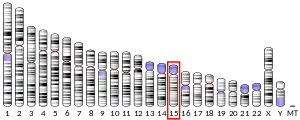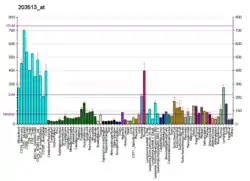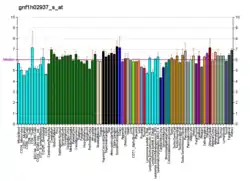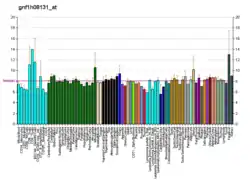SPG11
Spatacsin is a protein that in humans is encoded by the SPG11 gene.[5][6][7]
Pathology
Mutations of the SPG11 gene cause a rare form of spastic paraplegia, spastic paraplegia type 11.
References
- GRCh38: Ensembl release 89: ENSG00000104133 - Ensembl, May 2017
- GRCm38: Ensembl release 89: ENSMUSG00000033396 - Ensembl, May 2017
- "Human PubMed Reference:". National Center for Biotechnology Information, U.S. National Library of Medicine.
- "Mouse PubMed Reference:". National Center for Biotechnology Information, U.S. National Library of Medicine.
- Martínez Murillo F, Kobayashi H, Pegoraro E, Galluzzi G, Creel G, Mariani C, Farina E, Ricci E, Alfonso G, Pauli RM, Hoffman EP (July 1999). "Genetic localization of a new locus for recessive familial spastic paraparesis to 15q13-15". Neurology. 53 (1): 50–6. doi:10.1212/wnl.53.1.50. PMID 10408536.
- Stevanin G, Santorelli FM, Azzedine H, Coutinho P, Chomilier J, Denora PS, Martin E, Ouvrard-Hernandez AM, Tessa A, Bouslam N, Lossos A, Charles P, Loureiro JL, Elleuch N, Confavreux C, Cruz VT, Ruberg M, Leguern E, Grid D, Tazir M, Fontaine B, Filla A, Bertini E, Durr A, Brice A (March 2007). "Mutations in SPG11, encoding spatacsin, are a major cause of spastic paraplegia with thin corpus callosum". Nature Genetics. 39 (3): 366–72. doi:10.1038/ng1980. PMID 17322883.
- "Entrez Gene: KIAA1840 KIAA1840".
Further reading
- Hehr U, Bauer P, Winner B, Schule R, Olmez A, Koehler W, Uyanik G, Engel A, Lenz D, Seibel A, Hehr A, Ploetz S, Gamez J, Rolfs A, Weis J, Ringer TM, Bonin M, Schuierer G, Marienhagen J, Bogdahn U, Weber BH, Topaloglu H, Schols L, Riess O, Winkler J (December 2007). "Long-term course and mutational spectrum of spatacsin-linked spastic paraplegia". Annals of Neurology. 62 (6): 656–65. doi:10.1002/ana.21310. PMID 18067136.
- Nagase T, Nakayama M, Nakajima D, Kikuno R, Ohara O (April 2001). "Prediction of the coding sequences of unidentified human genes. XX. The complete sequences of 100 new cDNA clones from brain which code for large proteins in vitro". DNA Research. 8 (2): 85–95. doi:10.1093/dnares/8.2.85. PMID 11347906.
- Suzuki Y, Yoshitomo-Nakagawa K, Maruyama K, Suyama A, Sugano S (October 1997). "Construction and characterization of a full length-enriched and a 5'-end-enriched cDNA library". Gene. 200 (1–2): 149–56. doi:10.1016/S0378-1119(97)00411-3. PMID 9373149.
- Almenoff JS, Jurka J, Schoolnik GK (June 1994). "Induction of heat-stable enterotoxin receptor activity by a human Alu repeat". The Journal of Biological Chemistry. 269 (24): 16610–7. PMID 8206979.
- Maruyama K, Sugano S (January 1994). "Oligo-capping: a simple method to replace the cap structure of eukaryotic mRNAs with oligoribonucleotides". Gene. 138 (1–2): 171–4. doi:10.1016/0378-1119(94)90802-8. PMID 8125298.
External links
This article is issued from Wikipedia. The text is licensed under Creative Commons - Attribution - Sharealike. Additional terms may apply for the media files.






